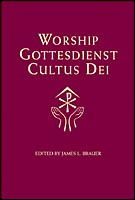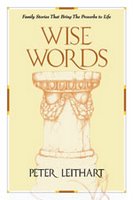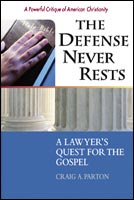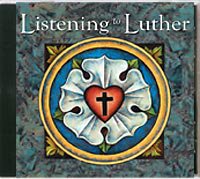
 Few issues are more hotly contested in Lutheranism than worship. Churches have split over this one issue. In The Lutheran Church — Missouri Synod much has been written about worship including Lutheran Worship History and Practice, Gathered Guests, Meaningful Worship, and The Unchanging Feast: The Nature and Basis of Lutheran Worship.
Few issues are more hotly contested in Lutheranism than worship. Churches have split over this one issue. In The Lutheran Church — Missouri Synod much has been written about worship including Lutheran Worship History and Practice, Gathered Guests, Meaningful Worship, and The Unchanging Feast: The Nature and Basis of Lutheran Worship.As editor of Worship, Gottesdienst, Cultus Dei, Dr. James Brauer of Concordia Seminary, St. Louis does not try to replicate the work of others. Instead, Dr. Brauer attempts to provide a useful resource for those interested in an in-depth study of Lutheran Worship as expounded upon in the Lutheran Confessions.
As opposed to offering a commentary on Lutheran worship as others do, Dr. Brauer chose to present all the references to worship in the Lutheran Confessions. Brauer uses the Kolb/Wengert edition of the Book of Concord nearly exclusively and also provides key phrases from both the German and Latin versions of the BOC. These are very helpful for those who are not as familiar with the original languages and are looking for textual variations in the Confessions without having to go through the full German and Latin editions.
This work is divided into nine distinct areas including Worship, the Word, Baptism, the Lord's Supper, Absolution, Prayer, Praise, Rites and Ceremonies, and finally a summary section. In addition, Dr. Brauer provides an excellent introductory section on the varying traditions of worship in different denominations including Pentecostals, Anglicans, Reformed, Anabaptists, Shakers, and many more.
As stated previously, Dr. Brauer's work is not a commentary on Lutheran worship. He provides a resource for use alongside other addressing the topic. For anyone interested in Lutheran worship theology and practice this is an excellent resource to use with the excellent resources on worship already in print. For those who do not know the original languages of the Confessions it can be frustrating with all the examples given. However, it might provide some a motivation for further linguistic study.
Personally, the final two sections (Rites and Ceremonies and the Conclusion) were the most interesting and helpful. Dr. Brauer does an excellent job of providing Christ centered commentary on the Confessions in his conclusion and refutes some of the arguments made against maintaining the traditions of the Church. For interested people, there is an excerpt available on the CPH website.
Worship, Gottesdienst, Cultus Dei: What the Lutheran Confessions Say about Worship
ISBN 0758605935
Concordia Publishing House, 2005
304 pp., Hardcover
CPH Item Number 53-1126WEB
Highly recommended for anyone interested in Christian worship.
Written by guest reviewer Sam Powell of Nerd Heaven and edited by Eusebius Sophronius Hieronymus.
Lutheran 'Nival XVIII at Full Throttle & an Empty Gas Tank includes a couple reviews from the Library and other confessional Lutheran posts of note from the past fortnight.
Karl hosts the next Lutheran Carnival at Full Throttle & an Empty Gas Tank. Entries are due Friday (24 February) evening. See the main blog for submission guidelines.
 Every Young Man's Battle is featured prominently in every Christian Book store and catalog. Part of the "Every Man Series on Sexual Integrity," it's touted as offering "strategies for victory in the real world of sexual temptation."
Every Young Man's Battle is featured prominently in every Christian Book store and catalog. Part of the "Every Man Series on Sexual Integrity," it's touted as offering "strategies for victory in the real world of sexual temptation."As a parent of four with my oldest just starting to drive, I'm new to the world of older teens. I initially purchased this book for my teenage son, but I'm very glad that I chose to first screen it myself.
Authors Stephen Arterburn and Fred Stoeker seem to provide more titillation than coping skills with their very graphic descriptions of their escapades with real life girls and pornographic images. There is so much emphasis on their own stories of uh ... "self abuse," that I question their motive in writing this book. I see that the author was born in 1953 — perhaps he suffers from the baby boomer tendency to let it all hang out.
From a Lutheran standpoint, the book is mostly Law and little Gospel, and somewhat works-oriented. The authors' worldview is that pleasing God by living a blameless life is possible and that God rewards those who earnestly seek Him.
The recommended coping strategies include training oneself to "bounce the eyes" and "corral the mustang mind." There is some decent advice in the chapter called Sexual Honor — mostly common sense info on avoiding tempting situations in the first place.
I'd love to see a book aimed at Lutheran teens on this sensitive topic — one that acknowledges original sin, emphasizes vocation and encourages private confession. I have not yet read Pr. Tim Paul's book, reviewed earlier, but look forward to doing so.
Every Young Man's Battle
by Stephen Arterburn and Fred Stoeker
ISBN 1-57856-537-5
Paperback
Feedback
Benjamin Myers of Faith and Theology made kind mention of the Library in the post, New theological blogs. Rather than just linking back, I suggest you visit him to take a look at one of the more interesting "Top Ten" posts you'll find: Essential ikons for theologians.
Orycteropus Afer's promised continuation on confessional Lutheran blogging has materialized. Visit Aardvark Alley for Building a Lutheran Presence; Part 2. Where Part 1 addressed the nuts-and-bolts of better blogging, the sequel shows ways of expanding one's readership and cooperating with other bloggers for increased traffic and search engine recognition.
Random Dan hosts Lutheran Carnival XVII: Septuagesima, with plenty of good entries and a guest appearance by Nikolaus Selnecker.
 Lutherans often shy away from morality stories, dripping as they are with the prodding of the Law even as it is too frequently disguised as the Gospel. However, Canon Press publishes a book of eighteen stories by Peter Leithart that might change a few minds in that regard, Wise Words: Family Stories That Bring the Proverbs to Life.
Lutherans often shy away from morality stories, dripping as they are with the prodding of the Law even as it is too frequently disguised as the Gospel. However, Canon Press publishes a book of eighteen stories by Peter Leithart that might change a few minds in that regard, Wise Words: Family Stories That Bring the Proverbs to Life.Each of Leithart’s stories is written after the fashion of a fairy tale in the tradition of the Grimm Brother’s. Each ends with a moral as an Aesop's Fable might. However, Leithart's morals are taken from the book of Proverbs. Now, that alone might be enough to send shivers down most rightly-dividing-Law-and-Gospel Lutherans' backs, and nix the decision for this book. However, the stories are well-written with rich details. For the careful catechist in the home or school, each story can be placed in Christ so that the Greater Reality is revealed. Consider "Ivy and the Prince," which was read to a group of First, Third and Fourth graders.
Ivy is a young girl who lives near a forest, in the midst of which is a thicket. Her father has told her never to cross through the briar thicket and go to the other side. Only danger awaits there. She will die. One day a rabbit convinces Ivy she can go around the thicket without actually disobeying her father. She does, and the rabbit becomes a dragon. As soon as he sets to devour her, a handsome Prince from a castle in the air rescues Ivy. He places a golden chain in her hair. Ivy is to use the chain to call for him at anytime. Ivy faints as the Prince gives the instructions, so the chain sits in her hair unnoticed. Ivy goes back to her father, and repents of her sin. Her father forgives her. Ivy, however, wastes away desiring to have the Prince return, but not knowing how to have him do so. Just as she is about to die, her father finds the chain in her hair. In an instant the Prince in there and the story ends as all good fairy tales do, happily ever after.Leithart chose Prov. 13:12 as the moral: Hope deferred makes the heart sick, but desire fulfilled is a tree of life. This falls flat as a moral applied to a simple fairy tale, but Leithart does not intend it to be so. He writes, "[T]he First Last Adams are always lurking just beneath the surface." Therefore, regard how the students applied elements of the tale to the Catechism.
"Where did Ivy go wrong?"
"She disobeyed her father.""What did her father do when she confessed her sin?"
"That’s the Fourth Commandment."
"He forgave her.""Who do you think the rabbit represents?"
'That's easy! He's Satan!""OK, Smarties, what is the golden chain all about?" Now they had to think. "What does Jesus give us to hold onto so we know He is with us always?"
"Yeah — and the Prince is Jesus."
"And the castle is heaven."
"Oh! I get it, Baptism!"Leithart is an ordained minister in the Presbyterian Church in America. What a blessedly iconic sacramental tale from a Presbyterian author — whether he intended it to be so or not. This is when Leithart's book shines. Each of his stories can be run through Christ. This is the value of such reading done by parents and teachers with children. Analogies fail at some point, and "Ivy and the Prince" is no exception. It is not the call of the church that causes Christ to come down; rather, Christ comes to His church according to His appointed Means of Grace. Therefore, a caution: read it to your children and discuss it with them. This book will provide many meaningful discussions.
"And His Word, His Absolution."
"And His Body and Blood."
Wise Words: Family Stories That Bring the Proverbs to Life
Peter J. Leithart
ISBN: 1591280141
Paperback
Also reviewed and further comments made at Quicunque vult…
 Going Out, Getting Dumped, and Playing Mini Golf on the First Date is a practical book. This doesn't mean it provides a list of practical dating advice for the perfect date. Nor can it be called practical because it can guarantee to make the teenage years a snap for parents by keeping kids out of sexual trouble. Instead, because it views the entire matter of sexuality from God’s perspective, Law and Gospel, its practicality is of a higher quality or genre.
Going Out, Getting Dumped, and Playing Mini Golf on the First Date is a practical book. This doesn't mean it provides a list of practical dating advice for the perfect date. Nor can it be called practical because it can guarantee to make the teenage years a snap for parents by keeping kids out of sexual trouble. Instead, because it views the entire matter of sexuality from God’s perspective, Law and Gospel, its practicality is of a higher quality or genre.That’s an immense subject to approach in only 126 pages for an audience of 13-18 year olds. However, Tim Pauls successfully accomplishes his goal by keeping his topic firmly grounded in Baptism. That is, when sexuality and dating are considered catechetically, the universal principle involved is God's institution of marriage at creation. According to God’s plan, marriage was for the sake of servanthood, not selfishness. By emphasizing the antithesis of relationships that are based on either servanthood or selfishness, Pauls brings clarity to God’s original plan for His people. In so doing, Pauls also reveals what the Baptized life in Christ ought to be. The unasked, but obvious, question by the end of the book is, "You are baptized and dating. In Christ you live in servanthood, not in selfishness. Now, what is it you want to do?"
Will this one little book make all the times of getting dumped easier to bear? Will it erase the selfishness from the lives of those who are dating? Does Romans 7 still not speak to the Baptized also? Going Out, Getting Dumped, and Playing Mini Golf on the First Date is not a fix-it for all dating woes — only the Parousia can do that! This book is a catechetical aid. It is the starting point for fruitful discussion.
Click below to order.

Going out, Getting Dumped, and Playing Mini Golf on the First Date
Technorati Tags: Christian | dating | boyfriend | girlfriend | sex | relationships | Tim Pauls | going out | getting dumped | mini golf | first date
Feedback
Lutheran Carnival entries are due in on Friday.
Check for formatting details and send entries to lutherancarnival AT gmail DOT com.
Originally posted on Necessary Roughness on November 14, 2005.
 On the plane to Houston, I finished The Defense Never Rests: A Lawyer's Quest for the Gospel by Craig A. Parton. Parton is a lawyer who left American Evangelicalism for Lutheranism in 1995.
On the plane to Houston, I finished The Defense Never Rests: A Lawyer's Quest for the Gospel by Craig A. Parton. Parton is a lawyer who left American Evangelicalism for Lutheranism in 1995.The text begins with his college days, studying for law school and active in Campus Crusade for Christ. One class he took covered the writings of Christian theologians: Calvin, Luther, St. Augustine, etc. The differing points of view between Calvinism, Roman Catholicism, Lutheranism, and even American Evangelicalism caused him to reevaluate the validity of the Scriptures. All claiming to have derived their teachings from Scripture, so the author studies the Scriptures for himself, checking for validity in addition to seeing who was the closest.
Parton's study of the original Greek text surrounding Christ and the Resurrection lead him to believe the Scriptures. He assesses the testimony from scriptural and other sources, using his skills as a lawyer to determine reasonable doubt and other tools. Here the author makes a point: why would so many disciples allow themselves to be martyred if they knew the Resurrection was a lie?
Parton details the difficulty of reconciling the doctrine of American Evangelicalism with scripture, and his family attends their first Lutheran service on Good Friday, 1995, the service of Tenebrae. Here the full force of the law was preached, with the consequences of our depravity. On Easter they heard the Gospel, with all the joy and consequences of the Resurrection. Satisfied, they joined the church.
The author notes with a sense of irony that the church they joined was showing signs of evolution towards Evangelicalism: the "contemporary" service and the discarding of liturgy, the stopping of the use of the Small Catechism to teach children, the lack of Confession and Absolution, the disuse of the hymnal, and the lack of Christ-centered worship. He warns against this movement by "church growth" advocates who seek to pack churches by taking doctrine out of them. We should be able to defend our traditions and the validity of scripture, he writes.
The book has a nice appendix by John T. Pless, author of Handling the Word of Truth. Pless covers the scriptural origins of the ancient liturgy and how they point to Christ.
The Defense Never Rests is an easy read with something for everybody: a defense of the Gospel for those who don't believe, a witness of transition for those who don't like what they are hearing from the pulpit, and signs of heterodoxy and an admonition to defend what is right for those who have been the faith. I recommend it to anybody, Lutheran or not, and especially Appendix A to the writer of the Lutheran Jargon blog. :)
Recommended for those who wish to contend for the faith, whether in front of nonbelievers or in front of Christians wishing to deviate from ancient doctrine and practice.
Feedback
Cyberbrother Paul McCain is now sending new visitors to our growing little concern. Thank you, Reverend Sir.
Updated from original post on Necessary Roughness on October 16, 2005.
 I got to take a look at our recently purchased Issues Etc. books of the month for October, the Follow and Do series. Good stuff. The books are sturdy and small enough for kids. All the books are contain the six chief parts of Luther's catechism with illustrated. In five of the books (the exception being the one on The Lord's Supper) there is also a simple sentence or two that is either a summary or an example of the catechism. In the pages for the Fourth Commandment, there was an illustration of a parent telling the child to clean their room, and the child says, "OK". The Fifth (murder) was summed up as "Let's all be friends."
I got to take a look at our recently purchased Issues Etc. books of the month for October, the Follow and Do series. Good stuff. The books are sturdy and small enough for kids. All the books are contain the six chief parts of Luther's catechism with illustrated. In five of the books (the exception being the one on The Lord's Supper) there is also a simple sentence or two that is either a summary or an example of the catechism. In the pages for the Fourth Commandment, there was an illustration of a parent telling the child to clean their room, and the child says, "OK". The Fifth (murder) was summed up as "Let's all be friends."I test-read the Apostles' Creed and The Ten Commandments with my more vocal twin, and she loved them. I would read the simple sentence first, and she would immediately try to repeat the sentence. She immediately picked up the idea in the Sixth Commandment. The illustration was a kid in a store, and the explanation was that we pay fir candy before we take it home. We've done that before with toys and books. In the book on The Creed, when we got to Luther's explanation of the Second Article in all its glory, the illustration simply had five kids singing "Jesus Loves Me". I don't mind that at all, provided the second verse is sung as well—one can find Law and Gospel in there.
I like these books and was glad to find out my kids aren't too young for them. They can either look at the pictures and say what they think is going on, recite the simplifications, or surprise me one day and recite the Explanation of the Second Article. My three-year-olds don't have the patience yet for the original catechism text, but it won't be long until they'll want someone to read that to them too.
CPH recommends the books for four-year-olds. If you have a child that is developing language skills early, these can be used as young as age 2.
Feedback
Luther Library was listed among the "new (and excellent) resources" at Rebecca Writes, Dr. Andrew Jackson of SmartChristian.com called us "a very interesting new blog to watch and enjoy," and the Bulverist Online Chronicle has established a feed link to recent posts. Thank you three — and others, please remember that when you give us props, we'll respond in kind.
Warm welcomes from Cranach and Historica ecclesiastica sent a number of visitors to check out our new endeavor. Thanks to both.
Other bloggers, let us know when you review us and/or add us to your blogroll and we'll respond with a link back to your post.
 The preface to The Great Jesus Debates, by Douglas W. Johnson, has a quote which rather appropriately describes the contents of the book to follow:
The preface to The Great Jesus Debates, by Douglas W. Johnson, has a quote which rather appropriately describes the contents of the book to follow:The debates within early Christianity are subtle yet hideously complex. It is hoped that by stripping them to their basic concerns we will be able to see in them important statements about God, the human condition, and questions of the Christian life and salvation with which we still struggle.For Johnson, the "red thread" of early Christendom which he sees as the hallmark of orthodox Christian teaching is the centrality of Jesus Christ — who He is and what He has done — and the grace of God, and what grace means for our forgiveness and reconciliation to God.
I am no expert historian — I merely play one on my blog — but this is a nice addition to my library of historical theology. What Johnson does is to trace through the four major theological battles in the early church, without getting too hung up on the technicalities, and show how in each case it was really a question of Jesus and His grace given to the Church.
The introduction sets the stage by giving background to who Jesus is, what grace is understood as being, who the Holy Spirit is, the interplay of Christianity and surrounding culture, and a brief background of Judaism, the Roman Empire, and Hellenism (Greek culture) of that day. In this way, he sets many of the overall structures in place on which the debates which are discussed rest.
The four key debates he discusses are:
- The Gnostic and Marcionite controversies — the question, "Is Jesus really man?" He discusses Irenaeus and his understanding of Jesus' person and work, including recapitulation theology.
- The Trinitarian Controversy — the question, "How can Jesus really be God?" In this section Johnson tackles modalism, Arianism, and other related topics. Special emphasis is given to Athanasius and the Cappadocian Fathers.
- The Christological Controversy — the question, "How can Jesus be both man and God?" In this section Nestorianism, Eutycheanism, and other such heresies are discussed and the Chalcedonian definition of Christ is explored.
- The Controversy over Grace — the question, "How does Jesus' person and work affect me?" In this section the debate over the nature of grace and the need for salvation, most notably that of Augustine and Pelagius, is examined in great depth.
As history books go, this one is fairly clearly written, and operating from its admitted bias of orthodox Christianity, explores in reasonable depth the key debates and struggles facing the early church. If you are a pastor, you likely already have several other books covering this same subject. But if you are a layperson, this book could be extremely useful indeed, summarizing as it does some of the more difficult, yet important details of the Church's teaching on Jesus Christ and His saving work for us.
The Great Jesus Debates
ISBN 0758608624
CPH, 2005
192 pp.
Recommended to anyone with an interest in theology.
Crossposted at A Beggar At The Table
Feedback
Last night, Aardvark Alley began a short series of posts addressed to the whole of the confessional Lutheran blogosphere. In Building a Lutheran Presence; Part 1, he focused on the content and form of our individual blogs. This common sense approach to blogging echoes the Preacher: "Whatever your hand finds to do, do it with your might. (Ecclesiastes 9:10)"
The Aardvark thus encourages each confessional Lutheran who makes blogging an expression of his or her vocation to refuse to give less than one's best to the blog's writing, layout, substance, and style.
Still ahead are examinations of various means of attracting new readers and making blogs more visible and usable through search engines and referrals.
Originally posted on Necessary Roughness on February 1, 2006.
My girls turned three last month and consistently amaze. My older one by 40 minutes, the talker, is grasping the concept that letters mean sounds and is beginning to identify which letters mean which sounds. My younger one echoes simple melodies on pitch; "Ode to Joy" is her newest one.
These kinds of activities remind me of Deaconess Carder's remark that kids start catechizing in her school beginning at age four, during a question and answer session if I remember correctly.
Throughout the Small Catechism we see the phrase before five of the six chief parts, "As the head of the family should teach it1 in a simple way to his household." Given that the girls are quite amenable to parental authority at this point in time and also given these talents of the kids, I was looking for hymns that taught. Of course, one of the major blogging Lutheran pastors recommended the CD Listening to Luther.
 Listening to Luther is cased in a slimline cardboard jewel case. The inside left has a pocket for the lyrics of the hymns, the right side a plastic media tray to hold the CD by the center hole.
Listening to Luther is cased in a slimline cardboard jewel case. The inside left has a pocket for the lyrics of the hymns, the right side a plastic media tray to hold the CD by the center hole.There are 17 tracks on the CD. All spoken tracks are narrated by the same baritone with the typical Missouri non-accent. The first track is a spoken Introduction. The next 12 are the six chief parts, alternating between the recitation of each part and the hymn for the corresponding part. The hymns have been listened previously here with samples. Tracks 14-16 are the reading of the Daily Prayers, Table of Duties, and Christian Questions with Their Answers. The CD concludes with "Lord, Keep Us Steadfast in Thy Word," (MP3 sample).
All the hymns are taken from Martin Luther: Hymns, Ballads, Chants, Truth from CPH. They are sung in four-part harmony by a small group. I can't pick out individual voices among the parts, and the singers are very precise. They vary from verse to verse within hymns: SATB, SA, TB, men/women, and soloist. They are backed by varying combinations of instruments: pipe organ, calliope, harpsichord, classical guitar, clarinet, cello, and others. They are a good sample of whether one will enjoy the larger collection.
The CD is not one that someone sits back and "enjoys" like a normal music CD. If one enjoys sermons or talk radio they may enjoy the readings from the Small Catechism. I liked the music but found myself longing for large choir or congregational fullness—spoiled by Roskilde's Congregational Choir in the Christmas Mass, I suppose.
Suitable for catechizing three-year-olds? While I wasn't expecting KIDZBOP, some longer musical phrases (the "all" in We All Believe In One True God) might be tough. One song has twelve verses; another, nine; still another, seven. The concepts might require some more vocabulary, like "From depths of woe I cry to Thee, in trial and tribulation." :) The repetition of verses and good singing would likely spark the younger one's musical aptitude. I found "O Lord We Praise Thee" most catchy as a youngster.
Suitable for older kids and adults? It's good diversion from reading the text. Some people learn more when text is given from a different perspective. Since the hymns don't follow the recitations exactly, the hymns shouldn't be used to memorize the catechism. One can run afoul of Luther's admonition that:
...with the young people stick to one fixed, permanent form and manner, and teach them, first of all, these parts, namely, the Ten Commandments, the Creed, the Lord's Prayer, etc., according to the text, word for word, so that they, too, can repeat it in the same manner after you and commit it to memory. —Preface to the Small CatechismI enjoyed the CD and ripped it to my T|X. :)
1For the Ten Commandments, "them" instead of "it," obviously.
Recommended for those who want a good sample of the larger collection of hymns composed by Luther, for those who primarily memorize by listening, and for music history buffs who like to see hymns with the original text they reference.
Feedback
